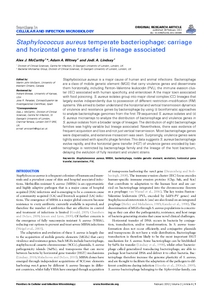McCarthy, AJ; Witney, AA; Lindsay, JA
(2012)
Staphylococcus aureus temperate bacteriophage: carriage and horizontal gene transfer is lineage associated.
Frontiers in Cellular and Infection Microbiology, 2 (6).
-.
ISSN 2235-2988
https://doi.org/10.3389/fcimb.2012.00006
SGUL Authors: Lindsay, Jodi Anne Witney, Adam Austin
![[img]](https://openaccess.sgul.ac.uk/101489/1.hassmallThumbnailVersion/fcimb-02-00006.pdf)  Preview |
|
["document_typename_application/pdf; charset=binary" not defined]
Published Version
Download (1MB)
| Preview
|
Abstract
Staphylococcus aureus is a major cause of human and animal infections. Bacteriophage are a class of mobile genetic element (MGE) that carry virulence genes and disseminate them horizontally, including Panton-Valentine leukocidin (PVL), the immune evasion cluster (IEC) associated with human specificity, and enterotoxin A the major toxin associated with food poisoning. S. aureus isolates group into major clonal complex (CC) lineages that largely evolve independently due to possession of different restriction-modification (RM) systems. We aimed to better understand the horizontal and vertical transmission dynamics of virulence and resistance genes by bacteriophage by using (i) bioinformatic approaches to analyze bacteriophage genomes from the first 79 sequenced S. aureus isolates and (ii) S. aureus microarrays to analyze the distribution of bacteriophage and virulence genes in S. aureus isolates from a broader range of lineages. The distribution of eight bacteriophage families was highly variable but lineage associated. Nevertheless, there was evidence of frequent acquisition and loss and not just vertical transmission. Most bacteriophage genes were dispensable, and extensive mosaicism was seen. Surprisingly, virulence genes were tightly associated with specific phage families. This data suggests S. aureus bacteriophage evolve rapidly, and the horizontal gene transfer (HGT) of virulence genes encoded by bacteriophage is restricted by bacteriophage family and the lineage of the host bacterium, delaying the evolution of fully resistant and virulent strains.
| Item Type: |
Article
|
| Additional Information: |
PMCID: PMC3417521
© 2012 McCarthy, Witney and Lindsay. This is an open-access article distributed under the terms of the Creative Commons Attribution Non Commercial License, which permits non-commercial use, distribution, and reproduction in other forums, provided the original authors and source are credited. |
| Keywords: |
MRSA, PVL, Staphylococcus aureus, bacteriophage, evolution, horizontal gene transfer, mobile genetic element, transmission |
| SGUL Research Institute / Research Centre: |
Academic Structure > Infection and Immunity Research Institute (INII) |
| Journal or Publication Title: |
Frontiers in Cellular and Infection Microbiology |
| ISSN: |
2235-2988 |
| PubMed ID: |
22919598 |
| Web of Science ID: |
22919598 |
| Dates: |
| Date |
Event |
| 2012-02-08 |
Published |
|
  |
Download EPMC Full text (PDF)
|
 |
Download EPMC Full text (HTML)
|
 |
Go to PubMed abstract |
| URI: |
https://openaccess.sgul.ac.uk/id/eprint/101489 |
| Publisher's version: |
https://doi.org/10.3389/fcimb.2012.00006 |
Statistics
Item downloaded times since 27 Jun 2013.
Actions (login required)
 |
Edit Item |




